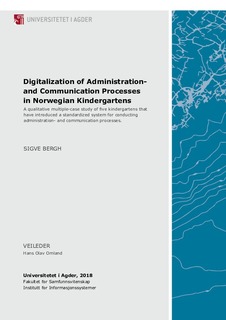Digitalization of Administration- and Communication Processes in Norwegian Kindergartens : A qualitative multiple-case study of five kindergartens that have introduced a standardized system for conducting administration- and communication processes
Master thesis
Permanent lenke
http://hdl.handle.net/11250/2563394Utgivelsesdato
2018Metadata
Vis full innførselSamlinger
Sammendrag
Organizing and effectively conducting administration- and communication processes in kindergartens has become more important due to an increase in the type of information that parents require. Having ways of digitally standardizing the numerous processes that kindergartens conduct has become increasingly common in Norwegian kindergartens. However, introducing digital change to a sector where many employees lack digital competence, has proven to be a challenge. While digital competence is a common challenge for kindergartens that choose to digitalize their daily administration- and communication processes, there are other challenges that are equally as important, and that needs to be prepared for and dealt with.
The underlying aim of study was that it could be used as a tool for kindergartens that are looking at the possibility of digitalizing their daily administration- and communication processes. A three-part research question was created based on the limitations in literature regarding this specific area of digitalization, and based on what I wanted the final result of the study to be used for. The research questions that have been answered in this study are: (1) What reasons do kindergartens have for digitalizing their daily administration- and communication processes? (2) What challenges arise for kindergartens in such digitalization projects? (3) What measures can be introduced to solve the most crucial challenges?
To answer the research questions, the study was conducted as a qualitative multiple-case study of five privately funded kindergartens in Norway. Within these five kindergartens, data has been gathered by conducting semi-structured interviews with four daily leaders and five pedagogical leaders. One daily leader and one pedagogical leader was questioned at each kindergarten. The exception was at one kindergarten, where only a daily leader was questioned. In addition to the semi-structured interviews, a literature review has been created which includes research from within three academic areas; communication, digitalization and change management. The literature review created a basis for the study, and allowed for results from the data analysis to be compared with the results presented in previous literature.
The findings indicate that kindergartens have many different reasons for wanting to digitalize. The reported reasons from this study are: being an innovative kindergarten, improved communication with stakeholders, an all-in-one solution, simplicity, increased efficiency, documentation/control and word of mouth.
There are many challenges that can arise in digitalization projects such as the ones being investigated in this study. Through the study, a total of eight challenges have been identified, whereas four are classified as crucial challenges that kindergartens need to be prepared for. The remaining four challenges are less common and less crucial, but are nonetheless important to keep in mind. The four most crucial challenges identified are: digital competence, parental involvement, employee involvement and resistance to change. The less crucial challenges are: parental control, economical aspect, technical infrastructure and functionality.
iii
There are also measures for dealing with the most crucial challenges. The measures that has been reported in this study are: communication, encouragement, IT champions, consultants and time. To best prepare for a digitalization project, kindergartens should focus on introducing all the mentioned measures as a tool for preparing to deal with the most crucial challenges. The measures affect each other, meaning that if for example IT champions are introduced, they can use communication and encouragement to affect the levels of the most crucial challenges. In addition to introducing the presented measures, kindergartens should uphold a strict attitude towards digitalization, by setting clear requirements for stakeholders regarding what is expected of them. Kindergartens should avoid having a liberal approach, meaning that employees and parents should not be allowed to choose whether they want to use the system or not. Kindergartens should also focus their attention on increasing the general attitude towards technology amongst stakeholders, and to always clearly communicate planned changes. If kindergartens manage to promote positive attitudes and a general interest in technology, they have come a long way towards a digitalized workplace.
Many of the findings in this study can correlate to what previous literature reports for technology innovations in the lower levels of education. While most previous literature reports on the digitalization of educational tools, this study reports on a different aspect of digitalization. Digitalization of administration- and communication processes is a theme that has not received a great deal of attention in literature. The findings therefore contribute to an area of literature that is quite new. For practice, the findings of this study can be used for other kindergartens who want to digitalize similar processes, and can give them insights into why they should digitalize, the challenges that they can face, and the measures they can use for dealing with challenges.
Beskrivelse
Master's thesis Information Systems IS501 - University of Agder 2018

